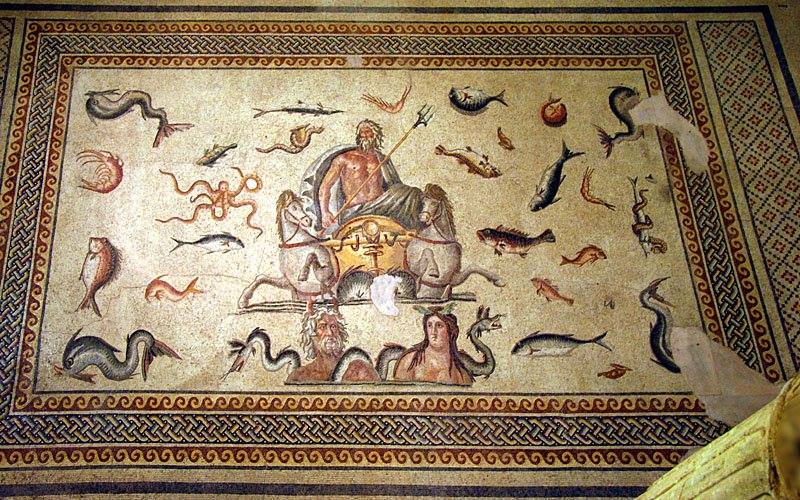In The Tempest, Ariel is trapped in a tree, and owes his liberty to the magic of Prospero, who managed the spirit's liberation from the wood.
 |
| Erysichthon |
He was hewing at the oak-tree repeatedly, when the sound of a voice came from inside the oak, chanting these words:
“I am a nymph, most dear to Ceres,
under the surface of this wood,
who prophesy to you, as I die,
that punishment will follow blood:
out of my ruin, the only good.”
The nymph is linked to the oak; instead of feeling liberated from the dark wood, she falls with it, her last words a vatic prophecy of the poenas that will be visited upon her unwanted liberator.“Nympha sub hoc ego sum Cereri gratissima ligno,
quae tibi factorum poenas instare tuorum
vaticinor moriens, nostri solacia leti.”
Apparently according to some versions of the tale (including an earlier poem by Callimachus), Erysichthon was eager to get that tree because he intended to build a dining hall.
Much as Erysichthon had penetrated the sacred wood, Fames (Famine) winds her way into the Thessalian King at night (not unlike Scylla's visit to Nisus):
Straight away she entered the bedroom of the sacrilegious man, who was sunk in profound sleep (since it was night), and breathed herself into him, covering his throat, and chest, and lips, with her exhalations, and causing a lack of nourishment in his hollow veins.Ovid goes on to describe the king as dreaming of feasts; he dines on empty images of food, on air. Then, like Aeacus in Book 7, he wakes up to find he cannot wake up: his dream now is his reality. The hunger implanted in him cannot be satisfied because it no longer is natural and susceptible of being sated. To one whose hunger is infinite, all the world is a stage, a set of images that furnish no nourishment. There is no difference for Erysichthon between his dream and his waking life -- both are devoid of substance, hollowed out by infinite desire.
The more he puts away inside, the greater his desire. As the ocean receives the rivers of all the earth, and unfilled by the waters, swallows every wandering stream: as the devouring flames never refuse more fuel, burn endless timber, and look for more, the greater the piles they are given, more voracious themselves by being fed: so Erysichthon’s profane lips accept and demand all foods, in the same breath. All nourishment in him is a reason for nourishment, and always by eating he creates an empty void.’Curiously the very similar tale (late in Book 2) when Athena calls upon Envy to infect Aglauros, arises from the mysterious birth of Erichthonius, who is sometimes also called Erysichthon.
What the Erysichthon of Book 8 does is put a hole in the wood, the selva of matter. Instead of releasing spirit into artful ordering action, he translates himself into a creature surrounded by images he must consume. Ovid's nymphs sustain themselves close to matter. Instead of desiring release from the trees, their joy is in being at one with them.
Taking down the tree creates a void. The world gets split into an insatiable consumer on the one hand and on the other, an abstract world of empty consumables. This leads to a new, fraudulent kind of exchange. Erysichthon's daughter Mestra becomes the original Bait and Switch artist, being sold again and again at market rates without ever delivering use value to the "consumer."
When her father realised that she could change her shape, he often surrendered Mestra to others, so that she, escaping in the form of a mare, or a bird, or again as a heifer or a hind, repeatedly obtained her price, dishonestly, for her gluttonous father.Mestra's tricks will later serve her grandson, Odysseus, well.


No comments:
Post a Comment